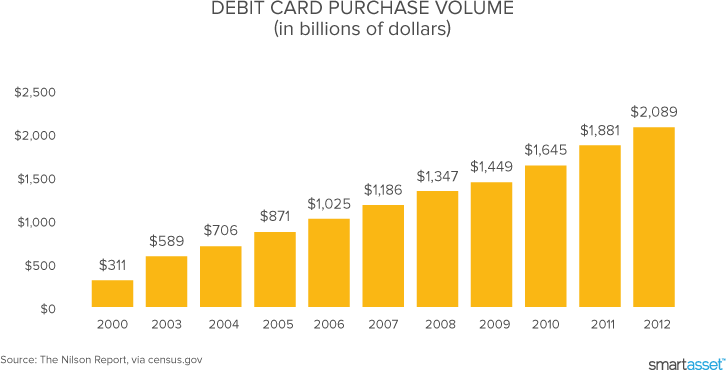Checking Account | Interest rate | MIN. BALANCE FOR APY | Account benefits | Monthly fee | Ad Disclaimer |
| HSBC Premier Checking | |||||||||||||||||||||||||||||
 | N/A | $100,000 |
| $50 | |||||||||||||||||||||||||
| |||||||||||||||||||||||||||||
| |||||||||||||||||||||||||||||
| Axos ONE® Savings & Checking | |||||||||||||||||||||||||||||
 | 4.31% | $0 |
| $0 | |||||||||||||||||||||||||
| |||||||||||||||||||||||||||||
| |||||||||||||||||||||||||||||
| SoFi Checking and Savings | |||||||||||||||||||||||||||||
 | 3.30% | $0 |
| $0 | |||||||||||||||||||||||||
| |||||||||||||||||||||||||||||
| |||||||||||||||||||||||||||||
More from SmartAsset
Checking Account Comparison

Checking accounts are the workhorses of the personal finance world. They're the bank account that let you pay bills, take out cash and deposit your paycheck, but they’ve never been particularly exciting. We’d be lying if we said we’re here to get you pumped up about checking accounts, but we can help you choose one that meets your needs.
Before we talk about different kinds of checking accounts, let’s talk about how you use money and how you would use your new checking account and debit card.
Finding the right checking account for you
Ideally, banks would offer clients more transparency and forgiveness in the checking account application process, but until that happens you’ll have to shop around. Our online tool will help you compare checking accounts and choose the one that’s best for you. Remember, you can have more than one checking account if you need to.
If you're a student or a senior, it can be a good idea to inquire about special checking options targeted to your needs. Maybe you have a checking account that carries fees now, but you’re not concerned because you’re earning big bucks. You still might want to consider switching to a no-fee account, though.
Applying for a new checking account is easiest when you’re employed and in the money. If you lose your job, you’ll find it much harder to pay any account fees — and to apply for a new account. Even if you’re happy with a long-standing checking account now, it’s worth looking into what other options are out there. Checking accounts have evolved a lot in recent years, so you may be surprised by the options. For a more in-depth view of some checking accounts take a look at our reviews, to learn more about checking accounts in general, read on:
Checking Account Reviews
Do you pay with cash?
If you love to pay for things with cash and you find yourself making frequent visits to the ATM, you’ll need a checking account that makes this easy, affordable and convenient. When shopping for a checking account, it's a good idea to find out how many fee-free ATMs you’d be able to use with that account. Some checking accounts even reimburse you for ATM fees if you use one that’s not in your network.
Have you ever overdrawn your account?
If you’ve overdrawn your account and might do so again, look for a checking account with low overdraft fees or overdraft forgiveness. If you've overdrawn in the past, it's a good idea to be wary of checking accounts that come with a minimum balance charge. If your income tends to be unsteady or you've drawn your account down to $0 in the past, you probably want a checking account with no minimum balance requirement.
How is your credit?
If you have bad credit or are worried about what a credit check might reveal, consider using one of the new brands of online-only banks working to make basic checking more available to people who have imperfect credit or who are "unbanked." Second-chance banking programs and credit unions may be good options as well.
Do you want to earn interest from your checking account?
When interest rates are low, the rates on interest-bearing checking accounts can be higher than the interest you’d make with a savings account. If you like to keep a sizable cushion of funds in your checking account, finding an account that will pay you some interest will put your liquid assets to work for you.
Do you like the option of going to a bank branch?
If you need to wire money or get cashier’s checks, the easiest way to do this is usually in a bank branch. Not all online-only checking accounts allow you to do this. If these are things you do with some regularity, consider choosing a bank with physical locations you can access.
Are you a jetsetter?
Some checking accounts and their debit cards come with foreign ATM fees and foreign transaction fees. Others don’t. So if you’re often abroad, make sure you shop around for an account that will work for you at home and away. Even an account that's advertised as a "free checking account" may not necessarily be free once you leave US shores.
Do you want to streamline your finances?
If so, you might want to go with a checking account linked to a brokerage account or other investment vehicle. This means you have fewer companies to deal with and fewer websites to check when you manage your money. Choosing a checking account from the same institution where you do your investing may also make it easier for you to save. If the money from your paycheck goes directly into your checking account, and every time you go online you have an easy option to contribute to your investments, that’s a good thing. This streamlining may make you more prone to save the money than if you had to mail a check to contribute to your retirement account.

Check out these checking account pitfalls
Just like there are certain features you want to seek out, when it comes to picking a checking account, there are some things you need to watch out for as well. Before a bank decides whether to let you open a checking account, they’ll check to see if you’ve ever run into problems with a checking account in the past.
This could mean unpaid bills, bounced checks and overdrawing your account. If you have this kind of event in your banking history, you may find it hard to open a new checking account because you’ll be considered a high-risk client. Just as whatever you do with your credit card shows up in your credit score from the credit reporting agencies, how you use your checking account gets reported too.
Banks and credit unions then use this information for checking account screening—aka deciding whether to let you open a checking account with them. Old overdraft problems can follow you as you try to set up a new checking account. Not all banks screen clients in this way, though, so shop around to find alternative banking options.
You learn the hard way about undisclosed fees

It’s time to talk about fees. When you go to set up a checking account, the process is generally fairly simple. Provide your name and some personal details like your address and Social Security number and you can be in business in a flash. At some point in that process, you’ll be handed (or emailed) a stack of dozens of pages of disclosures. In many cases, buried within these pages are fees and more fees. Some accounts come with monthly banking fees often known as maintenance fees. Others have fees if your deposits sink below a certain minimum balance requirement. Still others have multiple forms of overdraft fees that can all add up. A single account can come with upwards of 30 different fees. Even accounts advertised as “free” or "no fee" can levy hefty fees in certain circumstances. Want free checking? Read the fine print and ask questions so you can separate the truly free checking account from the rest of the pack.
What if you don’t (or can’t) get a checking account?
The millions of Americans who don’t use banking services are known as the “unbanked.” Without access to a checking account, unbanked folks rely on alternatives like check cashing businesses. It’s not easy, and it can be expensive.If you’ve been turned down for a conventional checking account, ask about second-chance checking accounts at nearby banks, or apply for a checking account with a credit union. Many credit unions don’t perform limiting background checks on applicants. There are also new nonprofits and startups aimed at meeting the banking needs of underserved communities.

